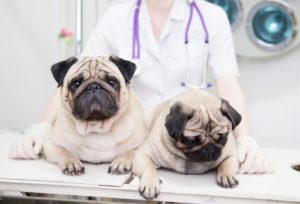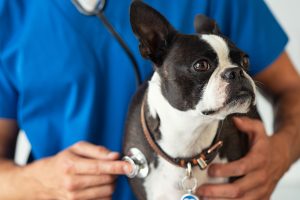
When you own a pet, there are many things to keep in mind.
You not only need to make sure their environment is safe for themselves, but also have a working knowledge of what pets should and shouldn’t eat, and keep their best interests at heart.
In addition, it’s important to know some pet first aid tips, just in case your pet requires emergency care.
Necessary First Aid Supplies For Pet Owners
First aid kits are not only important for humans. If you own a pet, you should have a pet first aid kit prepared in case of emergencies as well.
That kit should first and foremost include the phone numbers of your veterinarian, the nearest emergency veterinarian clinic (if your veterinary care provider doesn’t offer an emergency option), and the number for animal poison control. These phone numbers will be crucial if your pet is in distress and needs help.
Additionally, your pet first aid kit should include a leash, gauze, strips of cloth, adhesive tape for bandages (not human bandages), milk of magnesia, hydrogen peroxide, an eye dropper, a digital thermometer, muzzle, and even a board or blanket that can be used to stabilize an injured pet. These pet first aid supplies will have you prepared for a variety of emergency situations.
Why You Need These Supplies In Your Pet First Aid Kit
Obviously, you should use supplies like gauze pads, strips of cloth, and adhesive tape for wound care. If your pet has an injury and is bleeding, it is important to apply pressure and try to get the bleeding under control as quickly as possible.
A leash and muzzle are helpful if your pet is injured to keep both you and your pet safe. Especially if your furry friend has the tendency to bite when it’s hurt, the only way you can help them is to muzzle them.
A digital thermometer should be used rectally to monitor the temperature of your pet, and you can use the eye dropper to administer medicine or even to help flush a wound.
Lastly, the hydrogen peroxide can be used to induce vomiting in your pet, but should only be used after you have spoken to a doctor. Similarly, after speaking to a professional, you can use the milk of magnesia with activated charcoal to help absorb poison in your pet.

First Aid Tips For Pet Owners
What To Do When Your Pet Is Poisoned
If you suspect your pet has been poisoned, it’s important to act quickly. Whether you think your pet has accidentally ingested something that it shouldn’t have, or it was attacked and even purposefully poisoned, you must move fast. In fact, you need to seek veterinary care for your pet immediately.
When speaking to a professional on the phone they may suggest you use either the hydrogen peroxide to help your pet to throw up the poison or the milk of magnesia to help remove the poison before you can bring in your pet for further veterinary care. Either way, you never want to give your animal medicine without talking to a professional.
In many cases, your pet may only have a few hours before something critical happens. But, be sure to think clearly and make decisive decisions when your pets require emergency care.
How To Handle A Choking Pet
Another first aid tip you should know is how to deal with a choking pet. We all know that sometimes, our furry friends eat more than they can handle or chew on something that they shouldn’t. When that happens, you should be able to do something to alleviate your pet from choking.
If your pet is choking and clearly in distress, you should first try to see if you can see the object in the pet’s throat. Depending on the size of your pet, you might be able to open their mouth and actually see the object that is choking them.
If you can clearly see and grip the object, then proceed with that and pull the object from the throat. But be aware that your pet may be more likely to bite when it’s in choking distress. If you are unable to remove the object or your pet collapses, you should try to lay it on its side and strike the rib cage with the palm of your hands 3 to 4 times to try and remove the object.
Pet Safety And First Aid During Hot Days
During hot days, it’s particularly important to keep your pet’s safety in mind. If you suspect that your beloved pet is suffering from heat stroke, remove them from the heat as best and fast as you can. Place a cool or cold wet towel around its neck and head without covering the eyes, nose, or mouth. Switch out the towel regularly until you are able to get your pet to a vet for medical attention.
Handling A Bleeding Pet Wound
For external bleeding, it is best to muzzle your pet to help you better treat the wound. Press a gauze pad over the wound to help to control the bleeding, and make sure that you apply pressure in order to get it to stop. You may also want to consider using an eye dropper to help flush the wound from any dirt and debris. And again, seek medical attention from your veterinary care provider if you are unable to get the bleeding to stop, or the wound is large, because it may require further medical care. When in doubt, calling your vet immediately is never the wrong choice.
Suspecting A Seizure In Your Pet
Lastly, if you suspect your pet is having a seizure you shouldn’t put your hands near its face. Instead, make sure that you remove any objects around the pet so it doesn’t get hurt. You should time the length of the seizure because it’s very important information to give to your vet when you call them. After the seizure has stopped, be sure to call your vet and ask for further instructions on what to do with your pet.
These tips are important to internalize for any pet owner, and in some cases can be the difference between life and death. Just like it’s important to know first aid for humans, the same is equally true about your pets. To learn more about how to properly take care of your pets in an emergency, frequently asked questions, and tips for pet emergencies please contact us.
